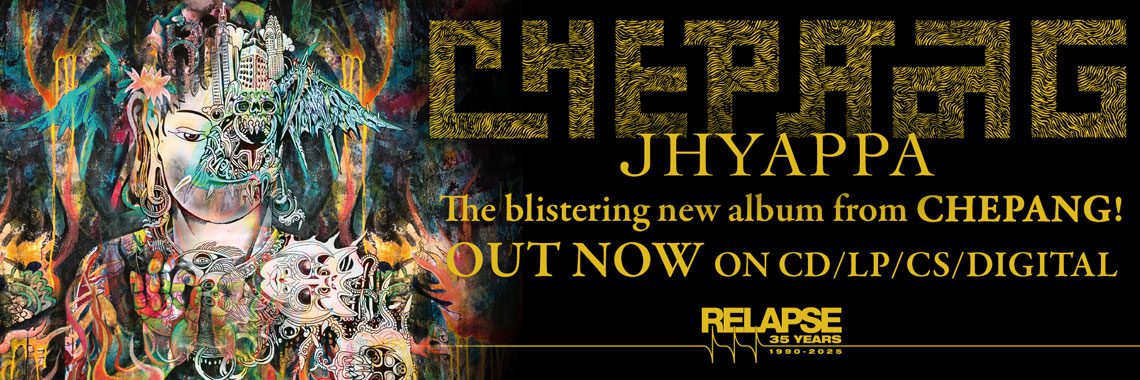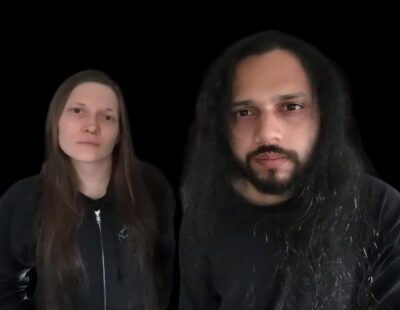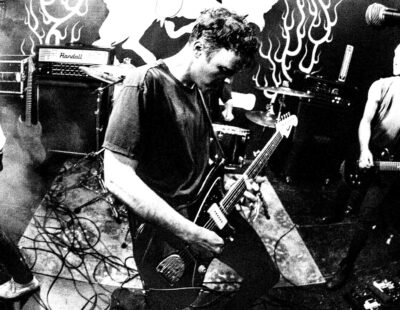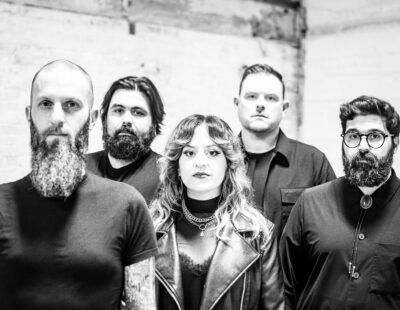Usually, when some public relations goomba contacts me, spouting off about how I’m guaranteed to love whatever new band they’re promoting, I go out of my way to hate that band. I used to do it subconsciously (probably) and don’t mean it as a slight to whatever band is in question, but as I’ve gotten older, more immature, increasingly agoraphobic, I’m always on the lookout for new ways to entertain myself that don’t involve venturing outdoors and communicating with the outside world, I’ve turned this feature of my job into one-part personal game of “impress me, motherfucker” and one-part taking offense that someone thinks they know the inner workings of my weird brain better than I do.
Enter Norway’s Blood Command. Enter the just-doing-his-job-PR-pimpology by one of my oldest friends in this godforsaken business. Maybe he knows me better than I think (or want people to know me), but I quite enjoyed the varied, angular and slippery post-core, noise-rock, punk-ish metal and metal-ish punk of this Bergen-based band. They have a new album entitled Funeral Beach coming out soon on Fysisk Format and are apparently pretty popular in the land where $20 might buy you a Coke. The Deciblog caught up with guitarist Yngve Andersen for an introductory email chinwag.
First things first, seeing as I know little to nothing about your band (and I’m assuming that most people reading this are in the same boat), can you give us the summary version of Blood Command’s history?
Yup! Blood Command was started in 2008 by [drummer] Sigurd [Haakaas], [vocalist] Silje [Tombre] and me, urging to fuck up the music industry and to play rock n’ roll. We started to record three or four weeks after we started the band. The plan was to keep it a studio band only, but hey, things change. From 2008 ‘til today we have released three EP’s and now (soon) two albums, and have been on numerous tours in Europe. Today, we are a five-piece instead of the trio that we started out as.
If we’re being honest here, your moniker doesn’t exactly suit your sound. When I hear Blood Command, what comes to mind is death metal. How and why did you settle on Blood Command as the name of the band? Any regrets?
Haha, that’s exactly why, because we want people to believe they’re getting something else when they first hear the name. We came up with the name because we wanted it to consist of the 80’s cheesy action movies Commando and Bloodsport. We wanted a name that sounded like what a 14-year-old would call his/her deathmetal band, not something Fall Out Boy-ish like names with many sentences like the ones that has flooded the music scene the last 5 years (The Devil Wears Prada, Iwrestledabearonce, those kind of names). Blood Command stands out and you’ll remember it because it wasn’t what you thought it would be.
How would you say that the bands you’ve been in previously have impacted what you’ve created with Blood Command?
It defined our playing style I guess. Sigurd was in a shoegaze band called Simon Says No!. Silje was in a short-lived-almost-all-girl-band called Wheelers and I was/am in a punkrock/hardcore band called Jeroan Drive. Silje and I met during a recording of Wheelers, and Sigurd and I met during a recording of Simon Says No!, so in that way it had an impact, haha. We brought with us some tricks from the other bands into this one I believe.
Legend has it that you’ve been the recipients of various music industry awards in your homeland. Can you give us non-Norwegians the rundown?
We won a “demo-of-the-year” contest in our local newspaper in 2009, and were nominated for the state channel’s “underground band of the year.” We were also nominated for the Norwegian Grammy (Spellemanprisen) for our 2010 album Ghostclocks (Kvelertak won that one). That’s all of the awards worth mentioning.
When one thinks of Norway, the first and automatic image that comes to mind is black metal. Obviously you don’t play black metal. What is the scene like for a band like yours at home?
There are a lot of great punk, hardcore, rock n’ roll-ish bands in Norway like Turbonegro, Kvelertak, Purified In Blood, Haust, Livstid, Social Suicide, Die X Legend, Feilfødt and Wolves Like Us, to name a few, and the scene is great. Great bands, great guys. A lot of cool shows happening and the DIY underground is on the rise.
How would you describe your sound and categorise your band if asked to while having a gun held to your collective temples?
We play punk n’ roll with a small touch from some of the hardcore bands we love; “deathpop” we call it. We sound like if Refused, Hot Snakes, Roxette and New Order had a baby together and it was vicious, angry and desperate.
So, give us the what, why, where and how behind the writing and recording of Funeral Beach?
Funeral Beach was written between two European tours and some heavy sessions of watching HBO. We recorded it with long time friend, Dagger, in Studio Lydriket. We had some free-of-charge recording time left from the prize we won in a local newspaper a couple of years ago. Rock n’ Roll is in danger and is about to die and we’re here to save it from its doom. Making sure the torch will proceed to burn. Funeral Beach is our contribution.
Does the title Funeral Beach have any special significance or is there a story behind the name and why you chose to call the album that?
If you bury dead bodies on a beach they will eventually emerge to the surface because of the moist, sand and waves combo. Funeral Beach means that all your dead and hidden skeletons from the past will come back to haunt you. Every mistake will come back if you keep trying to bury it. No one gets away. Face your mistakes, face your weakness, face your self-pity or else you’re fucked. Many of the lyrics on the album are about this.
How would you characterise the new album when compared to your previous recordings?
This one has the most brutal sound and the most catchy songs. It has a decent amount of more punk n’ roll vibe than the other recordings and Siljes voice has even got cooler on this one. And there are a lot more sing-a-longs. We changed some of the basics from the classic BC sound recording tricks. The song writing has evolved and the drumming rules! Sigurd is at his best on this one.
I don’t think I’d be out of line in pointing out that you guys are influenced by Refused to some degree. Here’s this interview’s Sophie’s Choice question: if someone guaranteed you a million bucks to stop playing your originals and play and tour as a Refused cover band for the rest of your days, would you do it? If not for a million, name your price.
Haha, no, no, no! We all LOVE Refused and they’re one of our main influences. The Shape Of Punk To Come is simply one of the greatest recordings ever put on tape! But we could never do that. Never, not for any price. We have to keep sailing on and save rock n’ roll with our own songs. That is what we must, that is what we’re called to do. Refused has done their part.
For tunes, videos, news and general check’emoutness, go to:
www.bloodcommand.com







